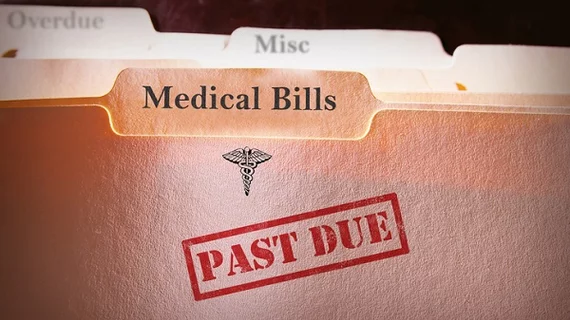No Surprises Act purportedly pushing providers in radiology and other specialties ‘to the brink’
The No Surprises Act and its slow-moving dispute-resolution process may be pushing some healthcare bond holders “to the brink,” according to a Bloomberg report published Monday.
The ban helped to trigger a few of the year’s biggest bankruptcies, including radiology provider Envision Healthcare, with investors now eyeing other debt-laden provider groups that could be vulnerable.
Bloomberg specifically cited imaging industry giant Radiology Partners, which has $2 billion in debts due over the next two years. Others on its list include KKR-backed ambulance company Global Medical Response (in talks to push back $4 billion in debts maturing in 2025) and Blackstone-supported staffing firm TeamHealth ($2.5 billion due next year).
“The No Surprises Act certainly puts pressure on healthcare companies that have that [out-of-network] exposure,” Clare Moylan, a co-founder of consulting firm Gibbins Advisors, told Bloomberg. “If you’re tight on margin already, and you lose that margin, then you have to find it elsewhere.”
For its part, Radiology Partners emphasized that it has “ample liquidity” and its earnings have not been materially impacted by the NSA, a spokesperson told the outlet. As of March, about 5% of Rad Partners’ business was out-of-network, with some risk that percentage could increase, S&P Global Ratings estimated at the time.
Earlier this year, Rad Partners was submitting out-of-network claims to the independent dispute resolution process and winning about 85% of cases. Yet, only 15% had actually been resolved and paid. That’s because the IDR process is running “very slow,” taking more than 250 days to settle disputes, and leading to a “significant” postponement in the receipt of payment, S&P noted.
“While this only affects a small part of Radiology Partners’ revenue, the delay in cash collections is weighing on liquidity and reducing the capacity for further operational challenges in the short term,” analysts said at the time.
Fitch Ratings estimates that providers initiated about 110,000 claim disputes under the NSA in Q4 of 2022, with about 31,700 resolved. That’s up from 71,900 initiated in the previous quarter and 20,700 resolved. Such numbers leave investors “increasingly concerned about the impact on corporate cash flows,” Bloomberg noted.
More from the outlet here (subscription required):

